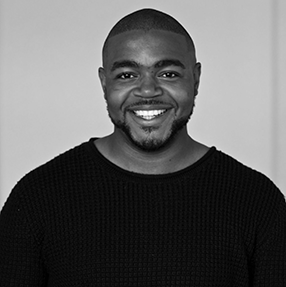Black Parade
Coming out isn’t the same as coming to America
except for the welcome parade
put on by ghosts like your granduncle Roy
who came to New York from Panamá in the 50s
and was never heard of again
and by the beautiful gays who died of AIDS in the 80s
whose cases your mother studied
in nursing school. She sent you to the US to become
an “American” and you worry
she’ll blame this country
for making you a “marica,”
a “Mary,” like it might have made your uncle Roy.
The words “America” and “marica” are so similar!
Exchange a few vowels
and turn anyone born in this country
queer. I used to watch Queer as Folk as a kid
and dream of sashaying away
the names bullies called me in high school
for being Black but not black enough, or the kind of black they saw on TV:
black-ish, negro claro, cueco.
It was a predominately white school,
the kind of white the Spanish brought to this continent
when they cozened my ancestors from Africa.
There was no welcome parade for my ancestors back then
so, they made their own procession, called it “carnaval”
and fully loaded the streets with egungun costumes,
holy batá drum rhythms, shouting and screaming in tongues,
and booty dancing in the spirit.
I don’t want to disappear in New York City,
lost in a drag of straightness.
So instead, I proceed
to introduce my mother to my first boyfriend
after I’ve moved her to Texas
and helped make her a citizen.
Living is trafficking through ghosts in a constant march
toward a better life, welcoming the next in line.
Thriving is wining the perreo to soca on the
Noah’s Arc pride parade float, like you’re
the femme bottom in an early aughts gay TV show.
Surviving is (cross-)dressing as an American marica,
until you’re a ‘merica or a ‘murica
and your ancestors see
you’re the king-queen of Mardi Gras,
purple scepter, crown, and krewe.
Copyright © 2020 by Darrel Alejandro Holnes. Originally published in Poem-a-Day on September 25, 2020, by the Academy of American Poets.
“I wrote this poem after learning about the connections between African masquerade, Mardi Gras, and Carnival for a play I wrote entitled BAYANO—about a warrior king who freed over a thousand Africans from slavery in Colonial Panama in the 16th century. The knowledge stayed with me as I saw COVID-19 sweep through New York and thought a lot about what it means to be Black, immigrant, and queer during this crisis in a city that was once devastated by AIDS. I wrote this poem as a tribute to my ancestors and elders from my communities who immigrated for a better life and perhaps found even greater challenges in their new homes than they left behind in their home countries; I wrote this to lift them up and to celebrate their stories with a parade they may not have been granted in life.”
—Darrel Alejandro Holnes

